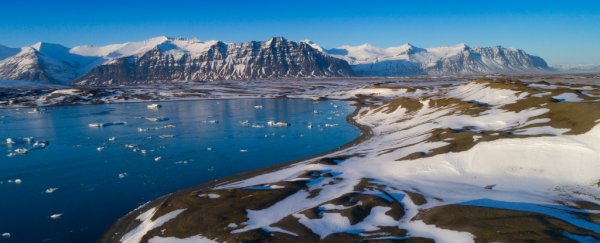No matter what we do, the Arctic of the future is going to be poles apart from the one we know today.
A new paper from the UN reveals that even if we pull the plug on all carbon emissions tomorrow, our hands are ultimately tied; the Arctic region is still going to warm by up to 5 degrees Celsius come the end of the century.
The reality is, we've simply emitted too many greenhouse gases, and now there's no escaping the consequences.
Even under the terms of the Paris Agreement, the research shows that winter temperatures in the Arctic are set to rise by at least 3°C by 2050 and 5 to 9°C by 2080 compared to pre-industrial levels.
The Arctic region is the virtual bullseye of climate change, but that doesn't mean the rest of the world gets off scot-free. As the top of our planet begins to melt, the consequences are certain to trickle down like a dripping ice-cream cone.
There is plenty of research to suggest that climate changes in the Arctic region will unleash dangerous sea level rises around the world, causing coastal flooding, erosion, and damage to buildings and infrastructure. It will also flip ecosystems on their head, contaminate drinking water, and drive mass human migration.
"What happens in the Arctic does not stay in the Arctic," says Joyce Msuya, the acting executive director at UN Environment.
"We have the science; now more urgent climate action is needed to steer away from tipping points that could be even worse for our planet than we first thought."
A major part of the problem is that the changes are going to devastate an already devastated region. Since 1979, research shows that the Arctic has lost roughly 40 percent of its sea ice, and the ice that still remains is thinner and more vulnerable than ever before.
Some climate models even predict that the Arctic's ice cap could disappear completely come summertime in the 2030s. As the melting reaches deeper and deeper it could awake "a sleeping giant" - a tipping point that could derail all our climate goals.
Even if the Paris Agreement is met, Arctic permafrost is expected to shrink 45 percent more, releasing billions of metric tonnes of carbon and methane into the atmosphere.
This will ultimately lead to even warmer temperatures, thawing even more ice in a vicious cycle called a 'positive feedback' loop. The consequences could include more frequent wildfires, habitat loss, and infrastructure damage.
One recent study found that by 2050, four million people and around 70 percent of today's Arctic infrastructure could be threatened by thawing permafrost.
Just as one domino knocks over the next, scientists think this tipping point will also set off another.
"When permafrost thaws, it contributes substantially to the organic matter load of surface fresh water delivered to the ocean, which in turn contributes to acidification through decomposition," the report explains.
"The release of methane by thawing subsea permafrost also contributes substantially to acidification."
Similar to climate change, the Arctic is disproportionately affected by ocean acidification. This region's marine species are especially vulnerable because the cold water they live in can hold more dissolved CO2, leading to greater acidity.
Today, surface waters are 30 percent more acidic than they were before the Industrial era, disrupting the food chain by causing corals, molluscs. sea urchins, and plankton to use more and more energy to build their shells and skeletons.
What's happening in the Arctic right now is a warning sign to prevent further warming. If we don't act soon, the paper suggests we may soon face a dead end, with no way to escape.
"The urgency to achieve the goals of the Paris Agreement is clearly manifested in the Arctic, because it is one of the most vulnerable and rapidly changing regions in the world," says the Finnish Minister of the Environment, Energy and Housing, Kimmo Tiilikainen.
"We need to make substantial near-term cuts in greenhouse gas emissions, black carbon and other so-called shortlived climate pollutants all over the world."
The paper was presented by UN Environment.
